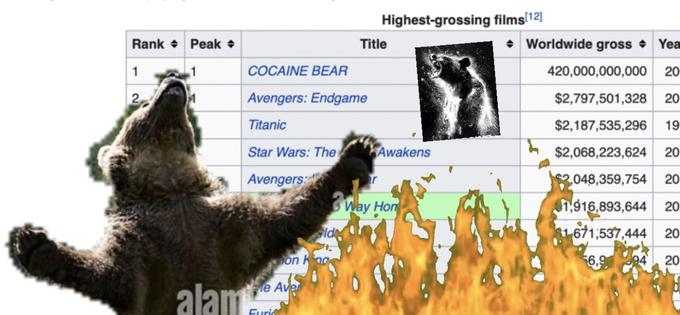Insights
Cocaine Bear: How Meme Marketing Conquered Hollywood
Cocaine Bear has dug its spectacular fangs into the hearts, memes, and wallets of America just like the black bear in the title dug its teeth into a sack of smuggled drugs. The film, which earned over 23 million dollars at the box office in its opening weekend, is giving Ant-Man 3 a run for its money and looks set to be one of the biggest successes of 2023 so far.

Many are drawing a link between the meme-centric Cocaine Bear marketing strategy and the movie's success. This wouldn’t be the first time movies and memes have danced together. Last summer, meme buzz convinced Columbia Pictures to re-release Morbius, leading it to flop twice instead of just once, and films like American Psycho have risen to a new cult status through their usage in meme formats. And of course the 2006 film Snakes on a Plane was one of the earliest to demonstrate the power internet culture holds over the entertainment industry. At this point, memes and movies seem to be a pairing nearly as iconic as hard drugs and apex predators.
So how did the makers of Cocaine Bear mobilize meme culture to craft a viral marketing success, and what does this tell us about the future of memes and film?
Making A Strong First Impression
The film's biggest draw is, arguably, the title. A lot of the movie’s appeal lies in the fact that what you see is what you get: a gory, crazed, hedonistic spectacle.
don’t overthink it. cocaine bear in 60 seconds. pic.twitter.com/V1tLWKpZcS
— Cocaine Bear (@cocainebear) March 1, 2023
In just two words, the title manages to communicate a character, a plot, and a likely outcome (drugged-up disaster). The brevity and catchiness of this hook stand out on a social media feed full of short-form content. It seizes attention quickly and efficiently. People (and algorithms) know what they're getting and how to classify it.
Drawing On Internet Culture History
Cocaine and bears were already connected in internet culture. The true(ish) story on which Cocaine Bear is based had already circulated widely on social media platforms.
But long before that, we had a different viral cocaine bear:

This bear meme was widely shared back in 2010 and was often used in connection with people like Charlie Sheen, whose drug escapes received a fair amount of attention from the press. The joke hit due to the absurdity of confusing what is clearly snow with a narcotic substance, along with the bear's wild, unrestrained manic energy that corresponds to a pop culture image of cocaine as a drug.
Cocaine Bear, unearthed a buried internet memory that had existed for well over a decade. It also latched onto a key theme in internet culture: animals. People just love animals.
The TikTok Effect
One of the stars of the film, Scott Seiss, is a comedy TikToker with a substantial following. He promoted the film on his TikTok account, bringing in a flash of organic charm which got the buzz rolling. By recruiting from the platform and emphasizing it, the film was able to reach audiences it otherwise might not.
https://www.tiktok.com/embed/v2/7203504823625420078
In this TikTok from Seiss, there's not only a fluent use of a TikTok sound but also a reference to another piece of very online culture: the Nicole Kidman AMC commercial.
Fighting Other Movies
The Scott Seiss TikTok from the last section also highlights an important element of the film's marketing: it wants to maul Marvel. The film set itself up in contrast to the gargantuan, ever-expanding blockbuster empire called the MCU, which many online have grown weary of. By taking on Marvel directly and saying it proudly, Cocaine Bear attracted even more attention: there's nothing people online like to look at more than a fight.
https://www.tiktok.com/embed/v2/7204263120179727662
As the TikTok above shows, it wasn't just Marvel that Scott Seiss and Cocaine Bear attacked, but other fictional bears as well.
Participating Organically
Cocaine Bear ran a Twitter account from the perspective of the bear, which embarked on a specific posting strategy: the account replied to and quote-tweeted content that was already out there about animals and drugs. Instead of just announcing itself (which, to be fair, it also did) the Cocaine Bear Twitter account became an active participant in online jokes, discussions and conversations started by other people.

Cocaine Bear made itself a part of the online conversation. It leaned into what was already happening organically, instead of trying to force its own strategy or narrative.
What Will It Mean For Society?
The movie business is always changing, along with the world. Cocaine Bear, a modern classic, may represent a broader overall trend in films: it's now important that a movie be as interesting to talk about or post about as it is to watch. In online culture, the type of media you consume is often tied to your identity.
For a movie to sell well in the internet age, it needs to be a compelling fixture to add to your curated online self. Nowadays, a movie is almost like a piece of clothing: people don't buy their clothes just to wear them or be comfortable, but because they want to be looked at a certain way. People don't watch a movie just to watch it, but to tell other people they've watched it.
Cocaine Bear is a fun thing to talk about, hear about, and post about. It was well-promoted. But at the end of the day, what makes it a classic is that touch of movie magic, that something you can't quite put your finger on: a strong idea, and a timeless theme. It’s too early for Oscars buzz, but Cocaine Bear may have won an even higher honor: an enduring place in online culture.
To learn more about Cocaine Bear check out our entry on the film.

Comments ( 0 )
Sorry, but you must activate your account to post a comment.